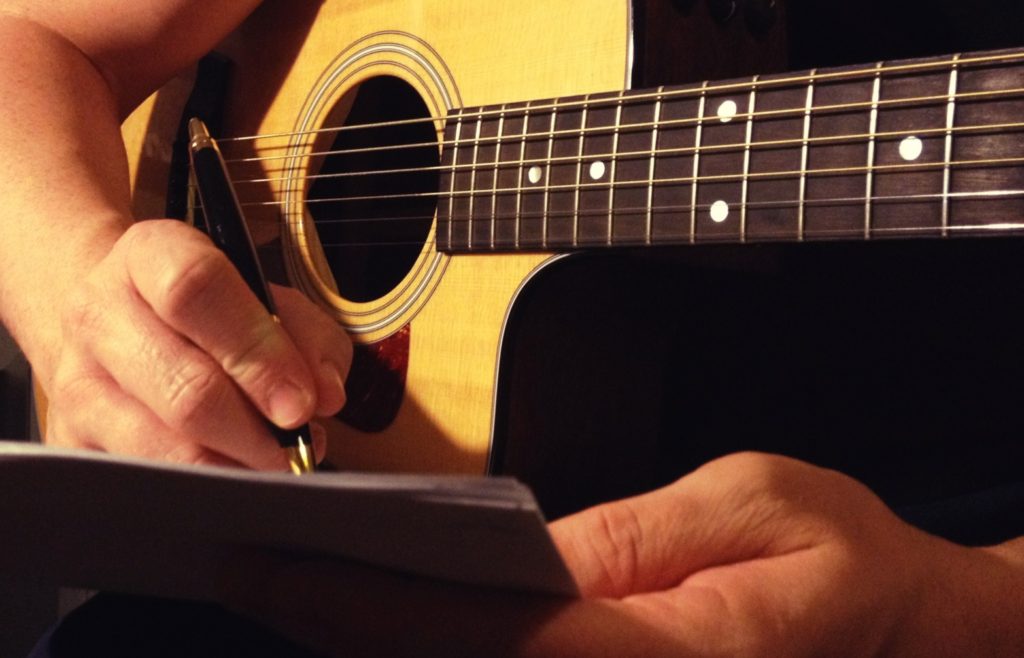How I Write a Song
By T. Perry Bowers
Paul Simon wrote “there must be 50 ways to leave your lover.” Well, there must be over 500 ways to write a song!

Everyone has a different approach to songwriting. This is just my process. I thought it might be good to describe it so that others who want to write a song of their own have a place to start. I’m not saying I’ve written any classic songs but I think there are a lot of people who over complicate things. Really, all you have to do is start. But remember, you might have to write ten songs before you come up with a really good one.
The first thing I do is start noodling around on the guitar. I just play some chords. It’s funny because I usually come up with something that I like within the first five minutes of picking up the guitar. There is something fresh about strapping on a guitar and playing. Play anything you like and if something sounds good to you, record it.
Record everything you like. When you’re playing a riff, you think you’ll never forget it. But, you will. Even if you remember the chords, you might forget the nuance and songwriting is all about nuance. One note out of place and suddenly the riff is garbage. Sometimes, I’ll write a part and record it, then over time the riff changes to something different. Maybe it changes because I start to add vocals, I get lazy playing it, and all the energy goes out of the song. If I go back and listen to the original riff I recorded and re-incorporate it, it has life again.
Once I have one riff, I try to find a second riff or chord progression. This might make a verse- chorus kind of deal. I may not yet know which part is the verse and which part is the chorus; I am just trying to make two parts go together. I don’t know a lot about music theory, so I can’t always tell you why a certain part fits with another part or why one part brings another part to a climax. I just listen and play. Over the years, I have definitely learned when parts do not go together!
A verse and a chorus don’t need to be that different. You may change one chord or your strumming pattern. Pop songs in particular are simple. In hip hop for example, the beat never changes. It’s the same chord or note structure throughout the whole song. Hit after hit after hit has been written this way. You don’t have to understand music theory to write a really good song. In fact, sometimes I think it hurts to know too much about theory. You have to get out of your brain to write a great song.
Next I write a bridge for the song. By this time I’ve already been humming some melodies. I try to start singing right away over the main guitar riffs – even before I’m completely competent at playing them. I do this because I want my singing and my playing to be one. This method gives me the most cohesiveness. I’m not trying to cram a melody on a riff. It also allows me to create transitions from part to part. I can use the vocal melody as a bridge.
Once I have the melody and the riffs, then I start to form lyrics. Most of the time, the lyrics come in chunks. The main lyric comes first. I just hear it and I sing it. Usually I don’t even know what it means. (I’ve written songs and haven’t figured out what they mean for years). I don’t come from a pop background, and if my songs don’t make sense to you, it’s ok, because they don’t make sense to me either! I just try to create a vibe. Your style may be very different. You may craft your lyrics over days and weeks. Whatever your process is, let it develop and keep doing it.
Once I have the chord progressions, the melodies and some of the lyrics, I start to play the song over and over. I’ll try to let the lyrics come naturally. I will stop during rehearsal sessions and write down things that come to me. Usually, after a few weeks of playing the song, the lyrics are all there. Now, all I have to do is tighten it up with my guitar pedals and play it with the band. I usually have the song completely written before I present it to the band. Maybe the lyrics are still forming, but the melody and the song structure is all there. But sometimes I need help with a certain part or a way to get from one part to another. This is where collaboration is great.
When you work in a band, collaboration can be really fun. It can also be very challenging. When you bring an idea to your band, be open to input. Try to remember your band wants to sound the best it can. And maybe your song just isn’t that good. Be open to that. My philosophy has always been, the more bad songs I write, the closer I am to a good one.
If you write a song you think is really strong, but your band doesn’t like it, save it for yourself. There’s nothing to say you can’t record or perform it on your own. Keep your inner voice alive. If it’s telling you that a song is good, and your band thinks otherwise, you can always ask them to give it one shot in front of an audience. The audience reaction will tell you if a song is good or not.
Hopefully you have a great collection of people in your band who want everyone to succeed. If that’s the case, be open. Keep listening to your inner voice and keep the songs flowing. You never know when the next billboard hit will come flowing out.

